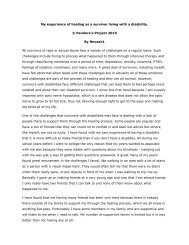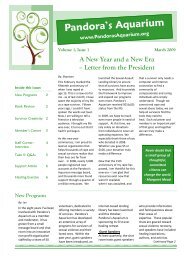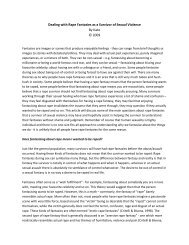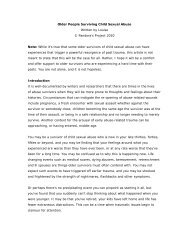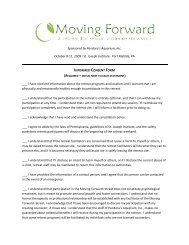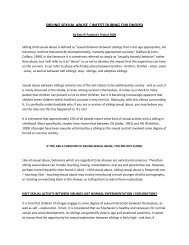Some Tips on How to Protect your Child - Pandora's Aquarium
Some Tips on How to Protect your Child - Pandora's Aquarium
Some Tips on How to Protect your Child - Pandora's Aquarium
Create successful ePaper yourself
Turn your PDF publications into a flip-book with our unique Google optimized e-Paper software.
• Watch for adults who:Refuse children privacy or invade their privacy.Insist <strong>on</strong> physical affecti<strong>on</strong> even when the child looks uncomfortable.Insist <strong>on</strong> “special time” al<strong>on</strong>e from other adults and children.Spend a lot of time with children instead of adults.Buy children expensive gifts for no apparent reas<strong>on</strong>.Appear <strong>to</strong> put a lot of effort in<strong>to</strong> getting close <strong>to</strong> children.Have had previous allegati<strong>on</strong>s against them before.Make you feel uneasy.....even if you can't put <strong>your</strong> finger <strong>on</strong> why.Your child or other children seem afraid of.Your child or other children do not want <strong>to</strong> be al<strong>on</strong>e with.• Questi<strong>on</strong> people who are trusted <strong>to</strong> look after <strong>your</strong> children and m<strong>on</strong>i<strong>to</strong>r.Ask any organizati<strong>on</strong>s about criminal background checks and professi<strong>on</strong>al recommendati<strong>on</strong>s /references.Ask about training of staff / policies if suspected abuse.If a child seems uncomfortable, or resistant <strong>to</strong> being with a particular adult, ask them why. Bepersistent.If an adult is taking a child <strong>on</strong> an outing, make sure <strong>to</strong> get specifics of it. Ensure they know that you arethe type of parent that asks questi<strong>on</strong>s!Always make a point of asking <strong>your</strong> child about their day. Use open questi<strong>on</strong>s, and be persistent if theyseem reluctant <strong>to</strong> give answers.Think about whether activities would be preferable in a group. Ask why something it <strong>on</strong>e-<strong>to</strong>-<strong>on</strong>e.“Molesters Do Not Wear an Ugly Mask. They Wear A Shield of Trust.”Stranger - DangerAlthough the vast majority of risks <strong>to</strong> <strong>your</strong> child do not come from strangers, it is vital that you teach<strong>your</strong> children about stranger danger. <str<strong>on</strong>g>Some</str<strong>on</strong>g> remarkably simple techniques can help <strong>your</strong> child <strong>to</strong> keepthemselves safe!Help <strong>your</strong> child <strong>to</strong> identify a stranger. When you are out and about - ask <strong>your</strong> child "Are they astranger?". Make it clear that just because you may know the pers<strong>on</strong>s face, they could still be a stranger(i.e. lady who works in the shop!).Tell <strong>your</strong> child never <strong>to</strong> talk <strong>to</strong> strangers unless they are with an adult they trust and never <strong>to</strong> goanywhere with a stranger. Identify trusted adults.If a stranger approaches them and asks them <strong>to</strong> go somewhere with them - teach <strong>your</strong> child <strong>to</strong> MAKE AFUSS. Tell them <strong>to</strong> make a noise, runaway <strong>to</strong> somewhere where there are a lot of people, scream etc.Tell some<strong>on</strong>e as so<strong>on</strong> as possible!



